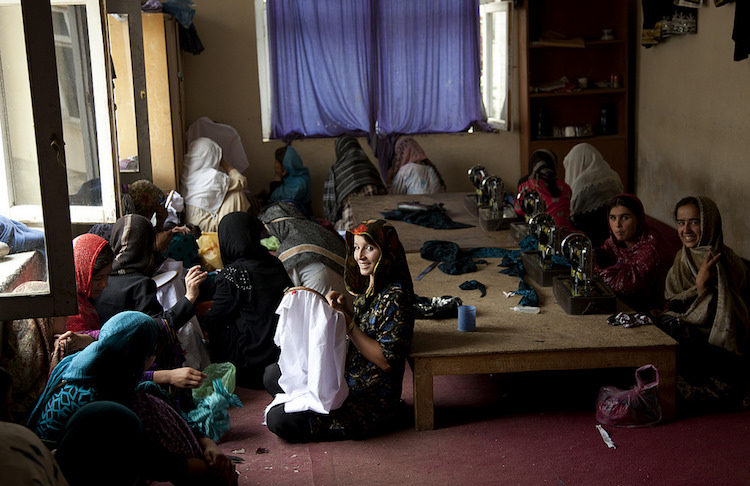By Devinder Kumar
NEW DELHI | KABUL (IDN) – The UN Assistance Mission in Afghanistan (UNAMA) has documented that, in 2017, 359 women were killed – five per cent more than in the previous year – and 865 injured. Altogether about 10,000 civilians lost their lives or suffered injuries in 2017.
It is against this backdrop that the UN in Afghanistan marked International Women’s Day on March 8, recognizing the global movement for women’s rights and the work of activists who have been central to the push for gender equality.
Afghanistan ranks 154th in the UN Gender Inequality Index, and this year’s Women’s Day – under the theme ‘Time Is Now: Rural and Urban Activists Transforming Women’s Lives’ – sought to draw attention to rural and urban women who are left behind in many areas of development.
The UN has welcomed the entry into force on February 14, 2018 of Afghanistan’s new Penal Code, described as a milestone in the country’s criminal justice reform and a vital part of efforts to strengthen the rule of law. According to analysts, with the new Penal Code, Afghanistan has for the first time a comprehensive criminal code, complying with international treaty obligations in criminal justice and incorporating modern best practices in criminology.
Together with international partners and experts from UN agencies, UNAMA supported Afghan authorities in drafting the Code. UNAMA will continue dialogue with “stakeholders” so that the application of the new code does not result in impunity gaps and in particular that there is a robust legal framework in place to protect women from violence.
The new Penal Code reinforces Afghanistan’s compliance with international human rights and criminal justice standards. It incorporates all mandatory crimes under the United Nations Convention against Corruption, the UN Convention against Transnational Organized Crimes (UNTOC) and its three protocols.
It also integrates the Rome Statute of the International Criminal Court covering war crimes, crimes against humanity and genocide, and establishes command responsibility for those who fail to prevent or punish subordinates who commit these crimes.
The Code expands the definition of the crime of torture in Afghan law to comply with the internationally accepted definition set out in the Convention against Torture. It responds to reform needs by codifying the crime of ‘bacha bazi’ (sexual slavery and child prostitution), land usurpation, the submission of incorrect asset declarations by public officials, and criminalizes forced virginity testing, a practice prevalent within law enforcement agencies.
Reforming the sanctions regime, the Code introduces alternatives to imprisonment, which the judges have the discretion to impose when sentencing to terms of imprisonment below five years, and have to mandatorily impose if the incarceration is less than three months. The new Penal Code also significantly reduces the number of crimes for which the death penalty applies.
UNAMA expects the entry into force of the Penal Code to bring significant positive developments and a real potential to trigger societal transformation. “The removal of the chapter penalizing violence against women, however, causes concern with regard to ensuring the strongest possible legal protection of women,” notes UNAMA.
Therefore, it is of the view that technical amendments to the Code will be essential to ensure that the criminal provisions of the Law on the Elimination of Violence Against Women (the EVAW Law) still apply. UNAMA notes that the current EVAW law remains in place and continues to provide overall legal protection for women, and remains committed to facilitating dialogue on ways to strengthen the criminalization of violence against women.
With a view to pushing for gender equality, the Afghan government has pledged to increase the presence of women in government to 30 per cent by 2020. For now, however, women’s participation countrywide is below this target, notes UNAMA.
The UN holds that effort should be doubled to ensure that women’s voices are heard in public and women are members of key decision-making bodies such as the Supreme Court or holders of senior positions such as governorships or ministerial appointments.
The government’s national priority programme to empower women economically is a key step forward to opening more doors for women’s participation throughout Afghan society, says UNAMA. It encourages the government to prioritize investment in education, healthcare and business financing for women to reduce the gap between women and men and foster gender equality.
The UN welcomes the government’s work to achieve the Sustainable Development Goals in Afghanistan, including addressing the needs of urban and rural women and girls.
“Empowering urban and rural Afghan women is essential to reducing poverty, inequality, and violence against women,” said Toby Lanzer, acting head of the UN in Afghanistan. As a recent meeting of the Kabul Process highlighted, “empowering women is also vital because real reconciliation hinges on women’s full and meaningful participation in the peace process.” [IDN-InDepthNews – 12 March 2018]
Photo: Vocational training centre for women in Faizabad, Bakakshan province. Credit: UNAMA | Fardin Waezi
IDN is the flagship agency of the International Press Syndicate
Facebook.com/IDN.GoingDeeper – twitter.com/InDepthNews

